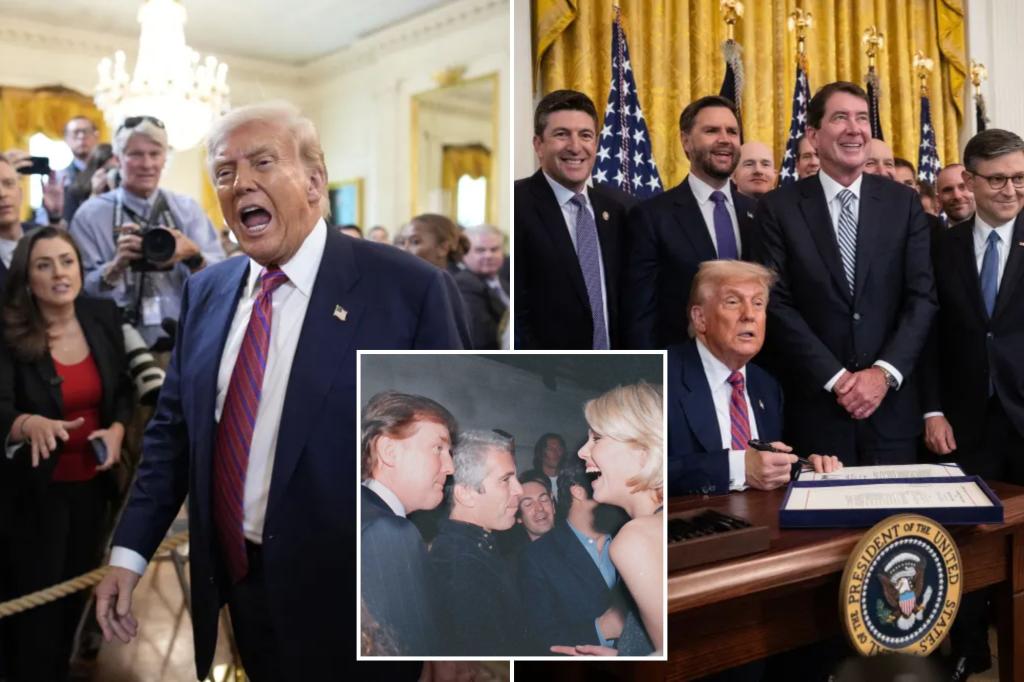Discover Why They Named It After Me: A Unique Personal Journey

Trump Signs Cryptocurrency Regulation Bill Amid Epstein Controversy
President Trump Signs the GENIUS Act
On Friday, President Trump sidestepped inquiries from the press regarding the ongoing Jeffrey Epstein scandal while he signed a new law aimed at regulating cryptocurrency. The legislation, designed to enhance the stability of dollar-backed “stablecoins” for swift financial transactions, was introduced during a ceremony in the East Room of the White House.
The GENIUS Act Explained
During the event, Trump humorously remarked, “They named the Genius Act after me,” as he was joined by Republican lawmakers, administration officials, and notable figures from the cryptocurrency sector, including the Winklevoss twins. The bill, officially known as the Guiding and Establishing National Innovation for U.S. Stablecoins Act, was championed by Senator Bill Hagerty from Tennessee. Trump emphasized the need to modernize what he described as an outdated digital payment system.
Importance of Stablecoins
Stablecoins offer users a way to mitigate the price fluctuations commonly associated with cryptocurrencies like Bitcoin. However, potential buyers currently have to rely on the assurances of providers claiming their coins are backed by tangible assets, such as U.S. dollars. The newly passed legislation, which received bipartisan support in Congress, mandates the creation of standards and oversight measures to bolster consumer trust and protection.
Industry Reactions
David Sacks, the appointed crypto czar, praised the bill, stating it would “unlock dollar dominance” and transform outdated payment systems into a more revolutionary framework. The legislation was approved by the Senate with a vote of 68-30 and subsequently passed in the House with a tally of 308-122.
Trump Avoids Epstein Questions
As the signing ceremony concluded, Trump did not take any questions from reporters, ignoring inquiries about the recent firing of Manhattan federal prosecutor Maurene Comey and his call for the release of grand jury testimony related to the Epstein case. Comey, who successfully prosecuted Epstein’s associate Ghislaine Maxwell, was dismissed amid heightened public interest in the case.
Ongoing Epstein Controversy
Trump has expressed frustration over the persistent focus on the Epstein matter, despite his own administration officials, including Attorney General Pam Bondi and FBI Director Kash Patel, reviving discussions around the issue. Bondi had previously hinted at potential revelations but later stated that no further disclosures would be made and dismissed the existence of an incriminating “client list.”
Epstein’s Death and Its Aftermath
The official report concluded that Epstein died by suicide in his prison cell on August 10, 2019. However, a surveillance video released by the Department of Justice revealed a one-minute gap in footage from near his cell, raising further questions. Trump, who had social ties with Epstein in the late 1990s and early 2000s, has criticized the ongoing scrutiny, accusing Democrats of using the situation to undermine him, despite his supporters advocating for transparency in the case.
Notable Figures Linked to Epstein
The Epstein scandal has implicated several high-profile individuals, including former President Bill Clinton, Prince Andrew, and Microsoft co-founder Bill Gates. Allegations have surfaced regarding their interactions with Epstein, with some facing accusations of having engaged in inappropriate conduct with his underage victims.







